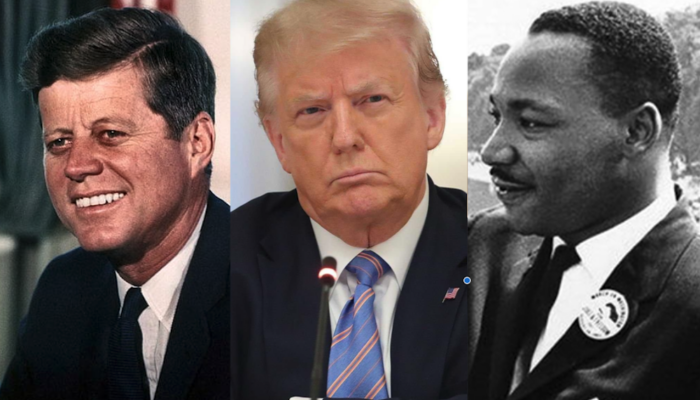For decades, questions have lingered regarding the assassinations of President John F. Kennedy, Senator Robert F. Kennedy, and civil rights leader Martin Luther King Jr. Conspiracy theories and speculation have only heightened public intrigue. However, the enigmas surrounding these pivotal events in American history may soon be clarified.
Despite prior document releases, many individuals believe that crucial information remains concealed within classified government files. On Thursday, President Donald Trump took a significant step toward illuminating these enduring mysteries by signing an executive order aimed at declassifying the remaining government documents pertaining to the assassinations of Kennedy and King.
According to an aide who spoke to Reuters, Trump’s executive order, signed on Thursday, pertains to the assassinations of former President John F. Kennedy, Robert Kennedy, and Martin Luther King Jr. This announcement, made at the White House, fulfills a commitment Trump initially made during his presidency in 2017.
“In the coming days, we are going to make public remaining records related to the assassinations of President John F. Kennedy, his brother Robert Kennedy, as well as Dr. Martin Luther King Jr. and other topics of great public interest,” Trump stated last week.
The National Archives and Records Administration (NARA) has previously revealed that approximately 97% of the nearly 5 million pages in its JFK assassination collection have been made available to the public. Nevertheless, thousands of pages remain classified or significantly redacted, leaving historians and the public yearning for complete transparency.
In 2022, a limited release of additional documents offered some insights, yet substantial portions were still withheld due to national security concerns. Under the President John F. Kennedy Assassination Records Collection Act of 1992, Congress mandated that all related documents be disclosed within 25 years; however, several administrations have cited security and privacy issues to postpone full disclosure.
Trump’s recent executive order seeks to eliminate these obstacles permanently. Many individuals believe that the documents contain crucial information regarding possible conspiracies related to Kennedy’s assassination, including the potential involvement of foreign governments, intelligence agencies, or organized crime syndicates.
During the late 1950s, the FBI kept a close watch on Martin Luther King Jr., ostensibly due to fears of communist infiltration within the civil rights movement, although no substantial evidence was ever provided to support these claims. Under the direction of J. Edgar Hoover, the surveillance tactics employed included wiretapping King’s telephones, bugging his hotel accommodations, and infiltrating the Southern Christian Leadership Conference, which he presided over.
The FBI’s tactics were intrusive and aimed at discrediting King, involving attempts to undermine his marriage and sending an anonymous letter that urged him to take his own life to avoid public disgrace. The existence of these files, which reveal the depth of the surveillance, has sparked considerable public and academic discourse regarding governmental overreach and the infringement of civil liberties.
The documents that remain undisclosed are mainly sealed government records, including comprehensive FBI surveillance files. In 1977, a U.S. district court mandated that these records be sealed for a period of 50 years, delaying their release until 2027.
The rationale for maintaining their confidentiality was rooted in concerns about privacy, national security, and the potential repercussions on King’s legacy and his surviving family members. Furthermore, the files are said to contain sensitive personal information, including allegations regarding King’s private life, which raises ethical dilemmas concerning their disclosure.
There are also apprehensions that the information contained within could be utilized to tarnish King’s legacy and influence, which continue to be significant to contemporary civil rights movements. Several civil rights organizations and members of King’s family have expressed opposition to the release of these files, fearing that they could be misinterpreted or exploited.


